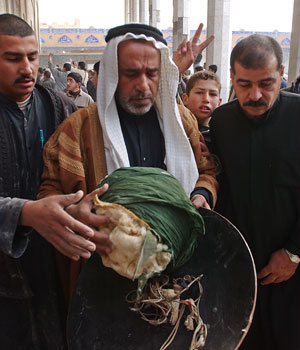
Iraqis inspect what appears to be the shield and turban of 9th century Shiite Imam Ali al-Hadi in a damaged shrine following an explosion in Samarra, 95 kilometers (60 miles) north of Baghdad, Iraq, Feb. 22, 2006 (AP)
SAMARRA, Iraq, (Reuters) – A dawn bomb attack wrecked a major Shi’ite Muslim shrine in the Iraqi city of Samarra on Wednesday, sparking street protests and forcing the government to issue an urgent appeal to avert sectarian reprisals.
At least one Sunni mosque in Baghdad was attacked.
Gunmen burst into the Golden Mosque, one of four key Shi’ite holy sites in Iraq, and planted explosives that brought down its 100-year-old, gold-covered dome, one of the biggest and best known in the Muslim world, senior officials said.
An Interior Ministry spokesman said the attackers wore police uniforms, tied up the mosque guards and set the charges.
Shi’ite Prime Minister Ibrahim al-Jaafari declared three days of national mourning — though in contrast to previous sectarian attacks no casualties were reported — and called for Muslim unity at a time when he is engaged in tense, U.S.-backed negotiations to bring minority Sunnis into government.
The interim government had sent officials to Samarra, 100 km (60 km) north of Baghdad, he said; the mainly Sunni city was sealed off to outsiders by security forces, residents said.
The leading Sunni religious body also condemned the attack, for which no group had yet claimed responsibility, as did Iraq’s president, Jalal Talabani, a Sunni Muslim Kurd, who called it a “shameful crime” committed in a Shi’ite holy month and aimed at derailing talks on forming a non-sectarian government.
Gunmen fired on a Sunni mosque in Baghdad’s Ghazaliya district and burned down its gate, police said. They were checking reports of attacks on other Sunni mosques in the city.
U.S. officials are pressing Jaafari to form a cabinet with support across the nation to avert the threat of a civil war that could thwart Washington’s efforts to withdraw its 130,000 troops.
Sunni rebels are strong in Samarra and there have been attacks recently on Shi’ite pilgrims visiting the shrine to the revered 9th century imans Ali al-Hadi and his son Hassan al-Askari. Shi’ite news Web sites said the blast had damaged relics of the buried imans, including a helmet and shield.
In the holy city of Najaf, Grand Ayatollah Ali al-Sistani, the revered authority for millions and a key force for Shi’ite restraint in the face of Sunni insurgent attacks, made a rare call for protests and declared seven days of mourning.
He insisted in a statement, however, that there must be no violence and in particular no reprisals against Sunni mosques.
Outside his office, where Sistani was meeting his most senior colleagues, 2,000 demonstrators chanted: “Rise up Shi’ites! Shi’ites take revenge! Rise up Shi’ites!”
“For the Shi’ites … this is a major assault comparable to an attack on Mecca for all Muslims,” said Hazim al-Naimi, a political science professor at Baghdad’s Mustansiriya University. “We will definitely see more sectarianism after this attack … It could push the country closer to civil war.”
About 1,000 demonstrators quickly took to the streets of the mainly Sunni city, and at one stage police said they had to fire over the crowd to keep order as protesters chanted Muslim and anti-American slogans.
There were smaller protests elsewhere and shopkeepers in some Shi’ite areas closed their stores for the mourning period.
Sectarian attacks on Shi’ite gatherings by the likes of al Qaeda, led by Jordanian Abu Musab al-Zarqawi, including suicide bombings that killed 170 people at a Shi’ite festival in 2004, have failed to spark all-out reprisals, though Sunnis accuse the Shi’ite-led government of condoning police death squads.
Leading Shi’ites say the elderly Sistani has been a major force in ensuring that restraint.
Wednesday’s attack followed bombings in Baghdad on the two previous days that killed some 40 people and broke a relative lull over the past month; talks have been continuing on forming a government after an election in December in which Sunnis participated in numbers for the first time.
The U.S. ambassador and visiting British foreign secretary both issued strong calls this week for Jaafari, an Islamist first appointed a year ago, to form a non-partisan government.
Witnesses in Samarra and television footage showed the top of the dome blown off and shattered masonry framed by two slender minarets. A U.S. military spokeswoman described the damage to the roof as “catastrophic”.
National Security Advisor Mowaffaq al-Rubaie, a Shi’ite, blamed Arab Sunni militants inspired by al Qaeda for the explosion, but appealed for calm: “They will fail to draw the Iraqi people into civil war as they have failed in the past,” he told the Al Arabiya Arabic television channel.
He was later quoted by state television Iraqiya as saying 10 suspects had been arrested in Samarra.
“We demand that the Iraqi government takes the most extreme measures against these terrorists. Forgiving these people would be totally rejected,” Salah al-Haidari, the head of the Shi’ite endowments in charge of Shi’ite mosques and shrines, told a Shi’ite television station.
About 1,000 protesters took to the streets in the mostly Shi’ite town of Kut, southeast of Baghdad.

Iraqis step over the rubble of the holy shrine Imam Ali Al-Hadi, which was destroyed by gunmen in Sammara, north of Baghdad, 22 Feb, 2006 (EPA)

Angry Iraqi Shiites demonstrate in Baghdad’s poor neighborhood of Sadr City to protest against the bombing of the holy shrine of al-Hadi in the Iraqi northern city of Samarra, 22 February, 2006 (AFP)

An Iraqi grieves while holding the bars of a truck that carries coffins during the funeral procession for victims of the previous days explosion in Baghdad, Feb. 22, 2006 (AP)
